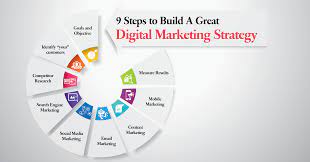What Is A Digital Marketing Strategy? Do you really know what a digital marketing strategy is or are you blurring the lines with marketing tactics? Read on to discover the clear distinction between strategy and tactics that even the marketing industry confuses.
Tech mistake | Without a digital strategy, how do you know your marketing is in the right place, appealing to the right audience, and being shown at the optimal time? A strategy reduces the time spent playing the guessing game and more time getting ahead of the competition. As a business, you’ll be prepared and informed of where to adapt when things change and the tactics to apply to future marketing campaigns. Planning is a skill that no marketer can choose to ignore. Yet many do, with 50% of brands without a defined digital marketing strategy!
The English dictionary describes a strategy as a plan of action designed to achieve a long-term or overall aim.’
Once you’ve defined what you want to achieve with your digital marketing, your strategy sets out how you’re going to get there. It is your plan to achieving your business and marketing objectives and goals.
Strategy & tactics: the difference
There is a misunderstanding within the marketing industry on the difference between strategy and tactics. Strategy at times is used more as a buzzword, the latest cool thing to describe your latest marketing activity.
- Strategy is the what, why, and where.
- Tactics are how you are going to achieve the strategy.
It’s often thought that if you’ve defined the tactics then you don’t need a strategy and vice versa, but that isn’t true. The two should work hand in hand and are both needed to achieve marketing success. However, the order in which you use them both is key to get right.
The strategy should always come before tactics. If you create tactics first, you may be in the wrong place to engage with your target audience. The same goes for strategy. There is a famous quote from Sun Tzu, The Art of War book: ‘Strategy without tactics is the slowest route to victory’ which sums up that strategy can only work if you have tactics to execute the plan.
How does a strategy achieve marketing and business goals?
The key defining factor is your business’s goals and objectives to the direction a marketing strategy should take. This is what makes your strategy unique to your business.
Typically, a marketing strategy should include the following:
- About your company,
- Your current situation for your business and marketing efforts,
- Previous performance,
- 1Your objectives,
- 2Your goals,
- 3Your target audience,
- 4Your competitors,
- 5Your marketing plan,
- Marketing,
- KPIs,
- Requirements to fulfill the strategy,
- Timeframe,
- Review stages and check-in points on the performance success of your strategy, tactics, and overall plan.
The important thing to always remember is that ‘A strategy is choosing what not to do’ by Michael Porter. If you include everything without research, analysis, insights, experience, and experts it won’t work. This is important to remember because it can be tempting to include everything, everyone else is right?… Your competitor might have a successful marketing strategy but that doesn’t mean it would be as successful for your brand. Why? Because every brand, business, and customer base is different. Your customers will have different expectations of what they get when engaging with your brand to your competitors.
Strategy evolution
One thing to keep in mind is the evolution of a strategy. With the ever-changing digital landscape this is vital because although you’ll have your plan, there needs to be the ability to be agile to react to changes in the market, new technologies, etc.
The plan is there as your guide, if something in your industry or your business changes then it’s important to accept that your strategy and plan will need to evolve and change in real-time. If this isn’t possible it’ll be difficult for your business to adapt. A marketing strategy that never evolves runs the risk of quickly going out of date.
Clearly, there is a lot that goes into creating a digital marketing strategy, who said Rome was built in a day?!
The article was originally published here.
